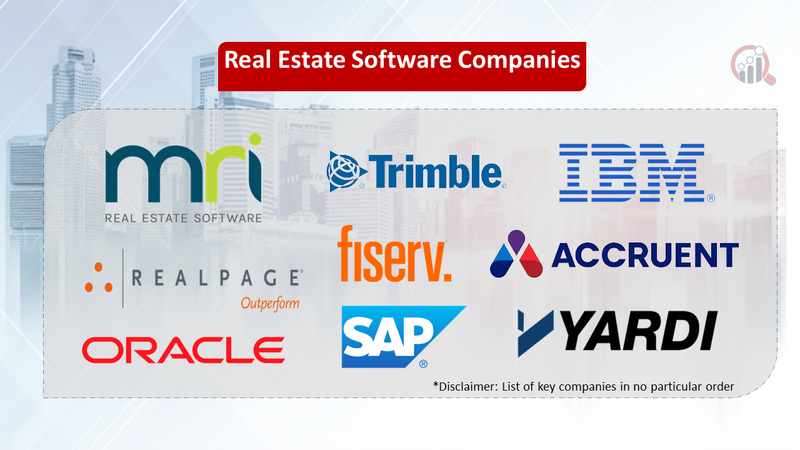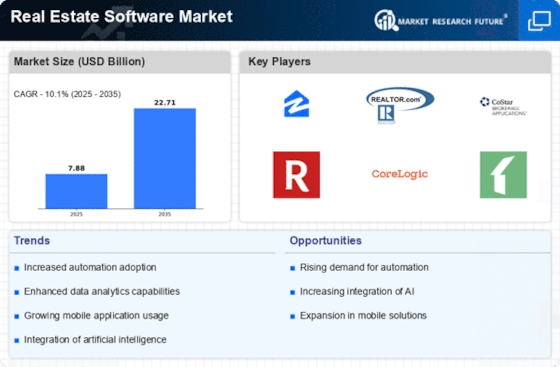Top Industry Leaders in the Real Estate Software Market

Competitive Landscape of Real Estate Software Market: A Landscape in Flux
The real estate software market is a dynamic ecosystem pulsating with a diverse range of players, from established industry titans to nimble startups. This vibrant landscape presents both opportunities and challenges, demanding a keen understanding of the competitive dynamics to navigate effectively.
Key Players:
-
IBM Corporation (US)
-
Accruent (US)
-
Trimble Inc. (US)
-
Yardi Systems (US)
-
RealPage (US)
-
MRI Software (US)
-
Fiserv Inc. (US)
-
Oracle Corporation (US)
-
SAP SE (Germany)
-
Autodesk Inc. (US)
-
CoStar Group Inc. (US)
Strategies Adopted:
-
Product Differentiation: Players are constantly innovating, integrating cutting-edge technologies like AI, machine learning, and blockchain to enhance their offerings. Features like predictive analytics, automated workflows, and virtual tours are becoming increasingly common, differentiating platforms and attracting customers.
-
Cloud Focus: The shift towards cloud-based solutions is accelerating, offering scalability, accessibility, and reduced IT burden. Established players are migrating their platforms to the cloud, while startups are leveraging cloud-native architectures for agility and cost-effectiveness.
-
Strategic Partnerships: Collaborations and acquisitions are a common theme, allowing players to expand their reach, access new markets, and acquire complementary technologies. For example, Yardi's acquisition of LeaseHawk broadened its commercial property management offerings.
-
Data Monetization: The abundance of data generated by real estate software presents a lucrative opportunity. Players are exploring data analytics and insights services to provide valuable market intelligence and decision-making support to clients.
Factors for Market Share Analysis:
-
Product Breadth and Depth: The range of functionalities and features offered by a platform significantly impacts its appeal. Comprehensive suites cater to a wider audience, while niche solutions excel in specific areas.
-
Customer Focus: Superior customer service, training, and ongoing support are crucial for building loyalty and retention. Players are investing in customer relationship management (CRM) and user experience (UX) initiatives to enhance customer satisfaction.
-
Pricing Strategy: Flexible pricing models that cater to different budget sizes and business needs are becoming increasingly important. Players are offering subscription-based plans, tiered pricing structures, and customized solutions to attract diverse clientele.
-
Technological Prowess: Integration of advanced technologies like AI and machine learning provides a competitive edge. Platforms that leverage these technologies for automation, data analysis, and improved decision-making are gaining traction.
-
Regional Presence: Global reach and localized solutions are critical for success in a diverse market. Players are expanding their geographic footprint organically or through strategic partnerships to cater to regional specificities.
New and Emerging Companies:
-
PropTech Startups: Startups like Stessa, OpenDoor, and Opendoor are disrupting traditional real estate models with innovative proptech solutions. Their focus on mobile-first experiences, data-driven decision-making, and alternative ownership models is attracting new market segments.
-
Vertical-Specific Platforms: Companies like Knock, Roofstock, and Arrived are catering to niche verticals like single-family rentals, crowdfunding, and fractional ownership. Their tailored solutions and focus on specific pain points resonate with investors and homeowners seeking alternative investment options.
Current Company Investment Trends:
-
Focus on Cloud Migration: Companies are investing heavily in migrating their platforms to the cloud, leveraging its scalability, accessibility, and cost-efficiency. This shift is expected to accelerate in the coming years, shaping the future of the market.
-
Integration of AI and Data Analytics: Players are actively integrating AI and data analytics capabilities into their platforms to automate tasks, generate insights, and improve decision-making. This trend is expected to drive product innovation and differentiation.
-
Investment in Cybersecurity: Data security is becoming a top priority with the increasing reliance on cloud-based platforms. Companies are investing in robust cybersecurity measures to protect sensitive client data and build trust with users.
-
User Experience (UX) Focus: Enhancing user experience through intuitive interfaces, mobile accessibility, and personalized dashboards is becoming a key differentiator. Companies are investing in UX design and development to improve user adoption and satisfaction.
Latest Company Updates:
-
January 17, 2024: Siemens announced a new partnership with Microsoft to develop AI-powered virtual sensors for industrial applications.
-
December 20, 2023: Bosch unveiled a new virtual sensor platform that can be used for a variety of automotive applications.
-
November 15, 2023: GE Healthcare launched a new virtual patient monitoring system powered by AI and virtual sensors.











